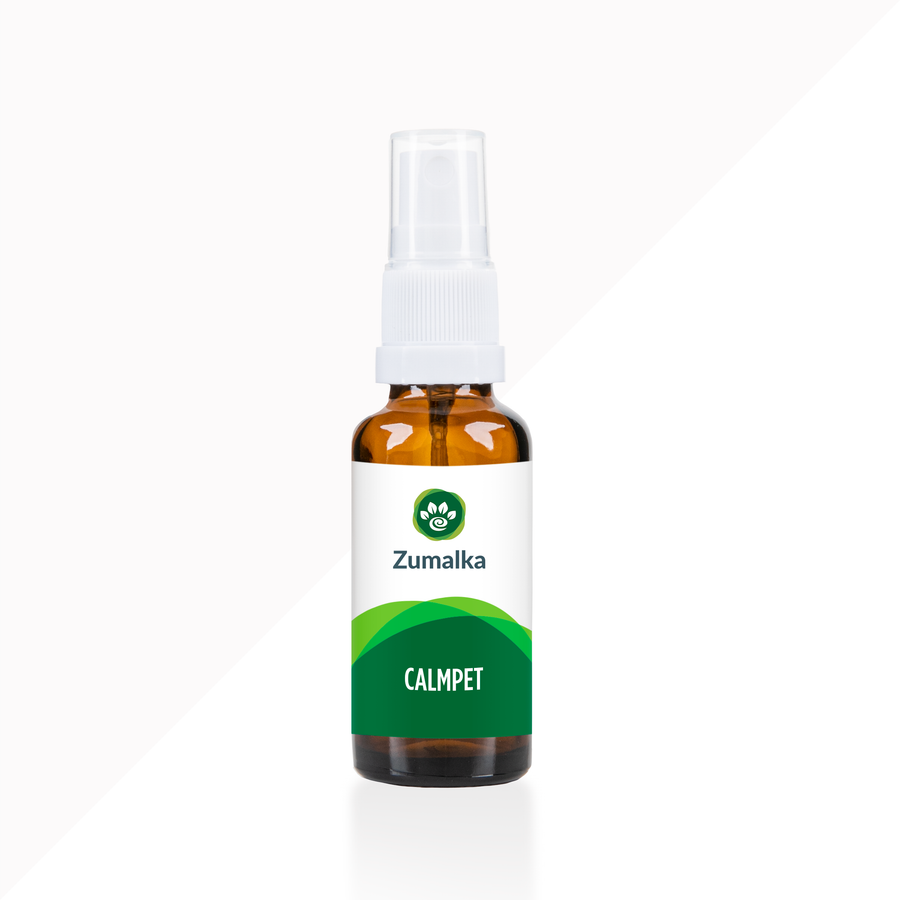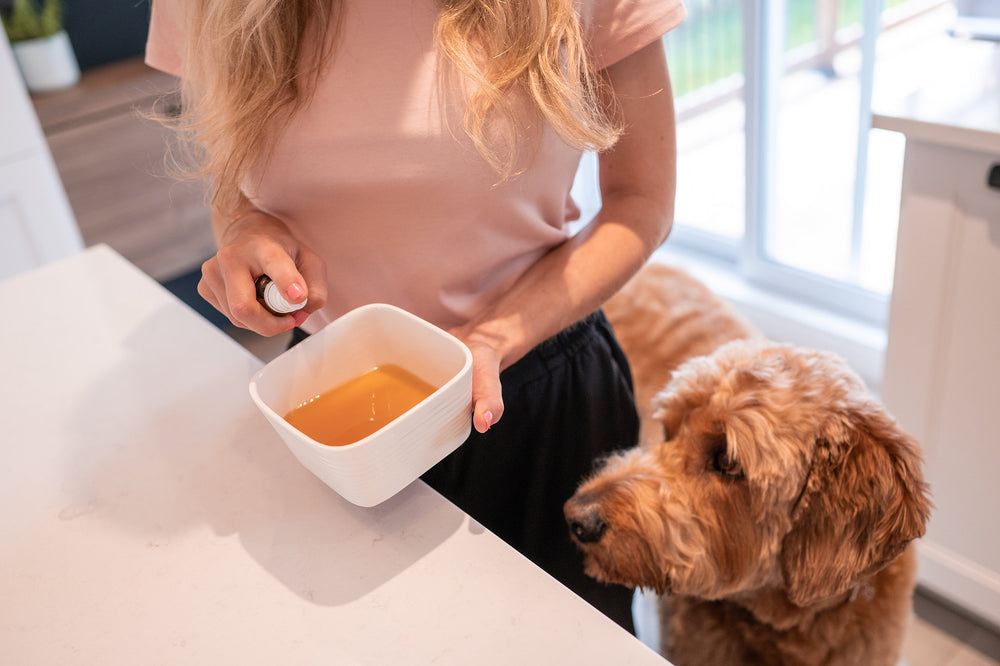Managing Dog Anxiety: 9 Essential Tips for a Calmer Pet
Dog anxiety isn’t just a phase, despite what many people believe. If left unaddressed, it can lead to serious behavioral issues that significantly impact your pet’s quality of life. That’s why understanding how to properly manage dog anxiety is essential for all pet owners.
Your dog could be prone to chronic anxiety without you knowing it.
Addressing your dog's anxiety is crucial to keeping your pet happy and healthy. In this blog post, I’ll share simple and practical ways to manage this issue. We’ll focus on behavior modification strategies without relying on conventional anti-anxiety medications.
A Quick Look at the Types of Anxiety in Dogs

Various factors can trigger anxiety in dogs. In the following section, we’ll explore some of the most common causes of this issue. It’s crucial to address anxiety early, as leaving it untreated can lead to more serious conditions, like cognitive dysfunction syndrome or destructive behavior.
Dog anxiety caused by trauma
An anxious dog has often experienced a traumatic event that causes a surge of uneasiness, dread, or fear. This could result from a painful injury, being separated from a loving family, or another distressing experience that triggers anxiety. In many cases, this type of anxiety appears suddenly in response to a specific event.
Separation anxiety in dogs
Dogs with separation anxiety may suffer from poor socialization or display behaviors like resource guarding, often due to unintentional stress caused by their owners. This type of dogs anxiety can be described as an extreme form of clinginess. Some dog owners report that their pets follow them everywhere—even to the bathroom—when this issue arises.
Canine anxiety triggered by health issues
In some cases, your dog's anxiety may be triggered by underlying medical conditions. While this type of anxiety commonly affects senior dogs due to age-related physiological changes, it can also occur in puppies, juveniles, and adult dogs suffering from illness.
Social or environmental dog anxiety
Sometimes canine anxiety can be caused by social or environmental factors that pet parents may overlook as harmless. Common triggers include loud noises from fireworks or vacuum cleaners, unfamiliar or strange people, and sudden changes in the environment. The loss of a dog's primary caregiver can also lead to fear and trigger signs of anxiety.
Regardless of whether your dog suffers from separation anxiety or noise-related anxiety, it is crucial to address the problem immediately. Managing anxiety early is the best way to prevent more serious issues, such as aggression or destructive behavior.
9 Essential Tips for Soothing Dog Anxiety
There are simple, practical methods to help alleviate your dog's anxiety. Failing to address the issue promptly can lead to behavioral problems, as well as unexpected physical symptoms like accidents or heightened aggression.
Contrary to popular belief, consulting a veterinary behaviorist or immediately resorting to prescription medications isn't always necessary to address this issue. In my experience as an animal homeopathy expert, many dogs respond well to the following alternative strategies.
#1. Establish a regular exercise routine for your anxious dog.
Canine anxiety is often triggered by unmanaged stress. Dogs typically cope with stress through physical and mental stimulation, which is why regular exercise and engaging activities can help them become less stressed and prevent anxiety.
The ideal exercise routine depends on the age, ability, and preferences of your dog. While puppies and juveniles can handle more demanding workouts, senior dogs typically benefit from low-impact exercises. When in doubt, a long walk is always a safe and effective option.
#2. Help your dog cope with anxiety in a safe space.
 Dogs with anxiety often feel the need to stay constantly alert. This can be alleviated by creating a safe, quiet space for your anxious pet, such as a designated room or crate. This strategy helps reduce your dog's stress levels and can improve the overall well-being of your pet.
Dogs with anxiety often feel the need to stay constantly alert. This can be alleviated by creating a safe, quiet space for your anxious pet, such as a designated room or crate. This strategy helps reduce your dog's stress levels and can improve the overall well-being of your pet.Don’t let the term "safe space" sound overly complicated. It simply refers to a place where your dog can find comfort when feeling overwhelmed, disturbed by loud noises, or during other stressful situations.
It could be a corner of the living room, a nook near the kitchen, or a spot on the patio. Be sure to include your dog’s favorite toy or blanket when you create a safe space to enhance their comfort.
#3. Practice gradual desensitization.
Think of this next tip as a behavior modification technique. When your dog shows signs of separation anxiety, gradually desensitize them to being left alone by increasing the time they spend apart from you in small, manageable increments.
If your dog shows signs of separation anxiety, focus on gradually increasing the time you leave them alone. Start with 10 minutes, then extend it to 30 minutes, and so on. Often, the root cause of separation anxiety is that the dog hasn’t been properly accustomed to spending time alone.
#4. Schedule regular bonding sessions.
Canine anxiety often develops when dogs feel ignored or isolated due to a lack of attention. This can lead to changes in normal behavior, such as restlessness or stress. To help your dog feel more secure, try engaging in regular cuddle sessions or, if you have time, take them to dog parks for socialization.
In my experience as an animal homeopathy specialist, I’ve found that one of the most effective ways to reduce anxiety is through regular grooming. Not only does this support your dog’s overall well-being, but it also provides the attention and care needed to prevent anxiety triggers.
#5. Incorporate mental stimulation into your dog's daily routine.
Incorporating mental stimulation into your dog’s routine can help prevent the fear and anxiety that arise from boredom or stress. Simple exercises and training sessions are already very effective. Additionally, encouraging your dog to play with food puzzles is a great way to provide mental enrichment.
Always remember that your dog may exhibit destructive behaviors if it’s struggling with anxiety. Providing mental stimulation encourages your dog to stay focused and engaged, which can help reduce the fear and anxiety that lead to unwanted behaviors.
#6. Positive reinforcement goes a long way.

Did you know that a simple pat, kiss, or hug can help reduce your dog's anxiety? Many pet parents overlook the fact that their body language can inadvertently make their dog feel neglected, which may contribute to anxiety. Regular physical affection reassures your dog and helps them feel secure.
Make it a habit to show your dog positive reinforcement regularly. This approach is also effective with other pets like cats and horses. Incorporating positive reinforcement into your daily routine can greatly help relieve or eliminate anxiety by building trust and reinforcing good behavior.
#7. Keep meal times regular to help reduce stress.
If your dog shows clinical signs of anxiety, one of the first things to consider is its feeding schedule. Dogs thrive on routine, and irregular feeding times can increase their stress and contribute to anxiety. Establishing a consistent feeding routine may help ease your dog’s anxiety.
Ensure your pet has a fixed feeding schedule as part of its regular routine. Inconsistent feeding can create stress or uncertainty, potentially leading to behavior problems like resource guarding or aggression.
#8. Calming music can be a great stress reliever for anxious dogs.
One of my favorite ways to reduce canine anxiety is by playing calming music. This can be enjoyable for both you and your pet, as soothing tunes like classical or ambient music can help create a relaxing atmosphere and ease anxiety.
Similar to humans, relaxing music can help dispel feelings of fear, abandonment, and isolation in dogs. By reducing stress hormones, it helps prevent anxiety from building up. Playing calming music is also a helpful tool for desensitizing dogs with separation anxiety, making them more comfortable when left alone.
Keep in mind that not all dogs enjoy the same type of music. Some may prefer slower, soothing tunes, while others might respond better to more upbeat melodies. You can turn this into a fun experiment by trying different styles and observing your dog’s reactions as you create an anti-anxiety playlist.
#9. Proper socialization helps prevent dog anxiety.

One significant factor that makes dogs prone to anxiety is a lack of proper socialization. Without sufficient exposure to different environments and experiences, dogs can experience elevated stress levels, which may lead to severe behavioral issues like aggression if not addressed.
Socialization can be as simple as introducing your dog to other dogs and people. While it’s common for some dogs to be slow to warm up, consistent exposure will gradually help them become more comfortable around others.
Proper socialization is essential if your dog has separation anxiety. In fact, starting this process at an early age can yield the best results, as it helps your dog build confidence and reduces anxiety when left alone.
Common Behaviors Anxious Dogs Display
It’s best to implement behavior modification strategies as soon as you notice symptoms of anxiety in your dog. The following are some common indicators of anxiety:
- Excessive vocalization or barking
- Increased sensitivity to noise
- Unexpected isolation or skulking
- Sudden aggression or indifference
- Extreme clinginess
- Sudden changes in eating habits, such as overeating or eating less
- Displaying 'whale eye' (showing the whites of their eyes)
- Newfound fear of people or other pets
These are just a few of the prominent signs of canine anxiety. If left untreated, anxiety can escalate into more serious behavioral issues that may require the intervention of a veterinarian or pet wellness expert.
A Final Word
Addressing your dog's anxiety symptoms as soon as possible is crucial. Constant fear and anxiety can significantly impact your pet’s overall quality of life, regardless of age, sex, or breed. Before resorting to conventional medication, consider exploring natural products such as calming supplements or pheromone sprays to help manage your dog's anxiety.
One natural option to consider is CALMPET. It helps maintain the balance of your dog's nervous system, supporting calmer behavior and improved social interactions. The natural homeopathic ingredients in CALMPET, such as Gelsemium 30k, Staphysagria 30k, and Solidago 30k, among others, work together to reduce anxiety and promote a sense of well-being in your dog.







Leave a comment